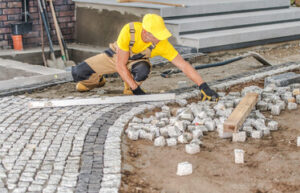Home » Posts tagged 'construction professionals'
Tag Archives: construction professionals
What You Need to Know About Concrete Contractors
Concrete Contractors are responsible for installing and repairing concrete structures in homes, businesses, roads, and other areas. The job requires strong technical and business skills. They must balance job site experience with office management knowledge to be efficient in their business. This means navigating the often complicated hiring, accounting, estimating, and bidding process.
 A concrete contractor is licensed to pour concrete on building projects, such as roads and sidewalks. Concrete Contractors Dallas TX use analytical and creative skills to help them deliver successful, high-quality projects.
A concrete contractor is licensed to pour concrete on building projects, such as roads and sidewalks. Concrete Contractors Dallas TX use analytical and creative skills to help them deliver successful, high-quality projects.
Depending on where they work, concrete contractors can focus on residential projects or commercial projects, such as public works and schools. This is because the tools, expertise, and skills needed are different in these fields.
In addition to a license, concrete contractors need to have two to four years of experience in the industry and be financially solvent. This is typically achieved by putting money aside in a bond.
Concrete Contractors need to have a good deal of experience to be successful in their work. This is because concrete construction requires a lot of work on the jobsite and the ability to finish projects quickly and efficiently.
Moreover, they need to know how to use equipment properly and ensure safety while working. They should also be able to read blueprints and follow written instructions.
It’s also important to consider how a concrete contractor interacts with clients. It could be a sign that they aren’t dedicated to their work if they seem standoffish or hesitant to answer your questions.
Whether you work on commercial or residential projects, you need a concrete license to perform your work legally. These licenses vary from state to state and are typically required by a local licensing authority.
Some states require concrete contractors to obtain a separate license, while others include the work with the general contractor’s license. Regardless of the license you obtain, you’ll also need to carry insurance.
The licenses you need as a concrete contractor can be obtained by applying for them through your state’s licensing authority. They typically require you to be at least 18 years old, have a few years of experience working with concrete, and pass a written test. You may also be required to put money into a bond.
Concrete Contractors need to have the proper insurance coverage. This includes general liability and workers’ compensation insurance.
Workers’ compensation protects employees who are injured on the job, including the costs of medical care and lost wages. It also offers protection against lawsuits.
Errors and omissions (E&O) insurance, also called professional liability insurance, can help concrete contractors if a client sues them for allegedly failing to deliver quality work or missing deadlines.
Inland marine insurance is another important concrete contractor insurance policy that provides financial protection for construction equipment and tools that are not permanently attached to a vehicle. It can be purchased as an addition to a business owner’s policy (BOP).
Every state has its own rules and regulations for licensing contractors. The qualifications for a license vary from state to state, but they usually include at least being 18 years old and having a few years of experience.
In addition to a contractor license, Concrete Contractors may also need a sales tax permit (an employer identification number or business ID number). This creates an account number with the state’s Department of Revenue to collect and remit sales tax.
Before starting a concrete business, decide what type of work you will be doing and which region your company will operate in. This will help you choose the appropriate permits and licenses for your business. It can also help you decide on a location for your concrete business.
Concrete contractors are professionals who specialize in installing and repairing concrete structures. Concrete is a durable and versatile building material used in various construction projects, from building foundations and driveways to sidewalks and retaining walls. Concrete contractors have the expertise and equipment to pour and finish concrete to meet specific project requirements. They may also provide concrete repair and maintenance services, including crack filling, leveling, and sealing. In addition to traditional concrete, some contractors may also work with decorative concrete, such as stamped or stained concrete, which can create unique and attractive finishes for outdoor surfaces. Hiring a professional concrete contractor can help ensure that concrete projects are completed safely, efficiently, and to the highest standards of quality.
The Importance of Concrete Pavement Design
Concrete Companies Queens NY consider pavement designs a crucial aspect of its installation. Determining a quality pavement requires understanding the different factors that influence the performance of a concrete surface. In addition, it is important to know the proper curing process for a concrete overlay. Appropriate curing will minimize the risk of warping and curling. Furthermore, adequate curing will ensure the durability of the surface and provide resistance to abrasion and water penetration.

A proper drainage system is essential for the performance of the concrete pavement. It is critical to use a uniform subgrade. In addition to the drainage system, it is essential to consider the surrounding area’s temperature. Changing climate conditions, including snow and rain, can reduce the life of the concrete pavement. Using these factors will help you select the proper paving solution. Once you have selected the proper materials, the next step is to select the best design for the site.
A good design for a concrete pavement must account for the climatic conditions. The climate of the area should be consistent and ideally, dry. The subgrade should also be drained in order to ensure proper drainage. Adding a drainage system to a concrete pavement will enhance its longevity. Providing adequate drainage is essential for pavement to last as long as possible. You can also improve the quality of the surface by selecting appropriate materials and techniques.
The type of subgrade, the temperature, and the amount of traffic on the road can influence the durability of the surface. Considering these factors, a concrete pavement should include expansion joints and draining systems. The temperature of the subgrade is an important consideration for a good design. It is important to know that this material will expand and contract during the day. Therefore, a concrete road design should include expansion joints. This will help the concrete road to the last longer.
The quality of the concrete pavement should be suitable for the climate. The right slab thickness is essential to make the road smooth and durable. In addition, the type of concrete mixture will determine the life of the pavement. A good mix of cement and water will make the surface smooth and durable. A uniform subgrade will also help to prevent slipping. The correct combination of these two factors will ensure a pavement that can withstand extreme temperatures. However, the amount of friction in the concrete mix should be determined based on the conditions of the local area.
The design of concrete pavements should consider these factors. Temperature is the most important factor for concrete road design. This is because the temperature changes and the level of precipitation can reduce the lifetime of the pavement. It is important to note that the temperature can also affect the durability of the pavement. During these changes, it is vital to make sure that the base course is stable and uniform. It is essential to provide sufficient support for the concrete road.
There are many factors that can affect the life of the concrete pavement. For example, climate conditions affect the temperature. The temperature and precipitation can affect the performance of the concrete pavement. These factors can cause the lifespan of the pavement to be short. Depending on the climatic condition, it is crucial to plan a draining system and uniform subgrade. If the temperature and precipitation are not consistent, the lifespan of concrete will be reduced as well.
The design of a concrete pavement must take into consideration the climatic conditions. The weather and climate affect the durability of the concrete. The temperature and humidity are both important factors to consider when designing concrete pavement. These factors may impact the durability of the pavement. The climatic conditions must be uniform. If the temperature is too high or too low, it can lead to cracking and crumbling of the surface. In such cases, the climatic conditions should be considered when selecting the material for concrete pavement.
It is essential to consider the climatic conditions in the area where the concrete pavement is being constructed. For example, climate conditions can impact the life of the concrete pavement. The temperature and humidity of the area can affect the durability of the concrete, so proper planning for the project must be taken. If these factors are not considered, the pavement will be vulnerable to premature wear and tear. For this reason, a proper drainage system is vital to the performance of a concrete roadway.